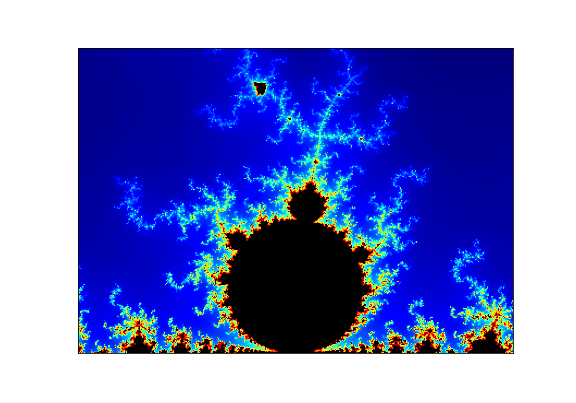Outreach
I run outreach events for open days and school visits which are designed to give participants a flavour of undergraduate mathematics whilst still being accessible to someone with a school level knowledge of the subject. These sessions make use of the programming language Python to produce plots, animations and sounds that demonstrate how mathematics is used in everyday life as well as research. The sessions can be tailored to individual needs.
If you are interested in arranging an outlook session please contact our faculty outreach officer Laura James (lj.james@mmu.ac.uk) for more information.
The outreach materials are written using Jupyter notebooks which makes it easy to enter and execute Python code.
Fractals

Fractals are complex and beautiful shapes that are generated using a simple set of mathematical rules. This session will introduce participants to some common fractals, show how they are drawn and how we can write Python programs to do this.
Mathematics of music

The creation of electronic music and the streaming of music over the internet used by apps such as Spotify, YouTube and TikTok would not be possible without mathematics. In this session you will be introduced to sine waves and how they can be combined to produce audio signals that replicate musical notes. In addition, you will see how a mathematical theory published 200 years ago is used to encode audio signals so they can be compressed and streamed over the internet.
Chaos

You may have heard of the Butterfly effect which comes from the question “Does the flap of a butterfly’s wings in Brazil set off a tornado in Texas?”, in other words, can a very small change in a system result in large changes elsewhere? This is what mathematicians refer to as chaos and in this session participants will be introduced to some examples of chaotic behaviour in relatively simple systems such as the motion of a double pendulum and the orbits of bodies acting under gravity.
Modelling a zombie outbreak


This session will introduce participants to a mathematical modelling technique called agent-based modelling where individual autonomous agents which could be a single animal or person are given rules to govern their behaviour. For example, in a social distancing situation each agent will want to avoid getting too close to another agent. We can use agent-based modelling to build mathematical models that simulate the motion of a flock of birds and the transmission of infectious diseases such as Covid or a zombie outbreak (unlikely to happen but you never know).
